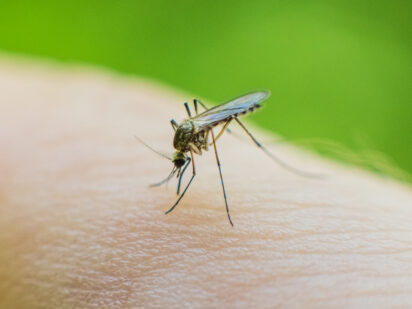The first human case of West Nile virus in North Dakota this season has been confirmed. According to North Dakota Health and Human Services, the individual was hospitalized and lives in Morton County.
Since the first confirmed case, North Dakota Health and Human Services mentions there are a total of ten cases in North Dakota. Two cases are in Morton County and Ramsey County and one case is in Burleigh County, Grand Forks County, Pierce County, Sargent County, Stark County and Williams County.
West Nile virus is primarily spread via the bite of an infected mosquito, with symptoms that include headache and body aches, fever, vomiting, diarrhea or rash. Most people who become infected, however, do not experience any symptoms.
Although no symptoms are experienced by most people who get infected with West Nile, according to North Dakota Health and Human Services, a small amount of people who are infected can experience severe symptoms that lead to brain swelling or possibly death.
Generally, cases of West Nile come up during the seasons where mosquitos are most active, which runs from the summer through the fall. While anyone who is outside for a short or long period of time is at risk to be infected, those who are ages 50 or older and those with a weakened immune system are at an increased risk of becoming sick and potentially developing the more severe symptoms.
“Many people, even when they get West Nile, don’t have any symptoms or don’t even know that they have it. If people are elderly or their immune system is weak and they know they’ve been exposed to a mosquito bite and they start having a fever or headaches, then they should seek immediate medical attention,” said Casmiar I. Nwaigwe, MD, infectious disease at Trinity Health.
Dr. Nwaigwe added that if someone is healthy and young, even if they believe they have been infected with West Nile, there is a good chance it will resolve on its own. However, if symptoms begin to show, those should not be ignored.
“If you start having a headache that is not getting better, then certainly you should seek medical attention to check if it’s West Nile and to make sure it’s not something else. Not everyone that has a fever or headache during the summer is due to West Nile, it could be other things,” said Dr. Nwaigwe.
According to Dr. Nwaigwe, dawn or dusk are heightened times for mosquito activity and doing things like wearing insect repellent or wearing long sleeves, even if the weather is hot, are good ways to help limit your risk from being infected with West Nile virus. Being aware of your environment is also important in limiting your risk.
“If you live in an environment where there is a water puddle or pond around you, using bug spray in that type of environment would help. The other thing is, you want to get rid of any free-standing water if you can because that’s where the mosquitoes breed. If you can get rid of that in your environment, that would help.”
While there is no specific treatment for West Nile, a trip to the walk-in clinic or the emergency room are important if someone develops symptoms that don’t improve or if they are concerned.
“If you feel if you are getting sick and you are worried that you have West Nile, the best thing that you can do is go to the emergency room or the clinic so they can evaluate you to confirm that it is West Nile. If you are very sick, they can get you to the emergency room and make sure there is nothing else going on.”
For more information on West Nile, the U.S. Centers for Disease Control and Prevention offers a variety of helpful information on their website, including data and maps that are updated frequently with West Nile activity in different parts of the country. To learn more, go to www.cdc.gov/west-nile-virus/.




